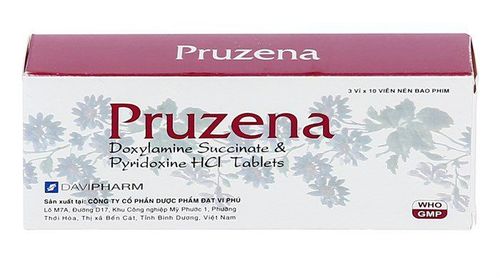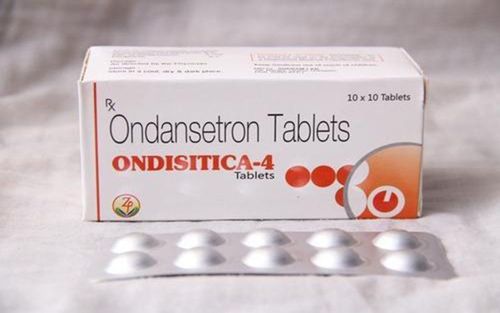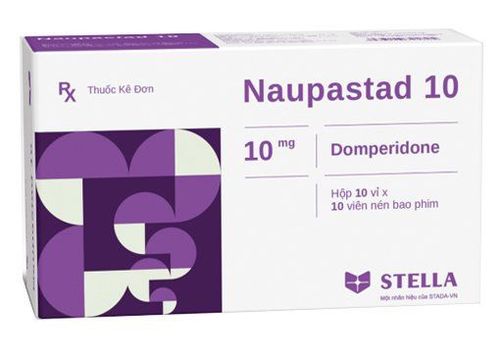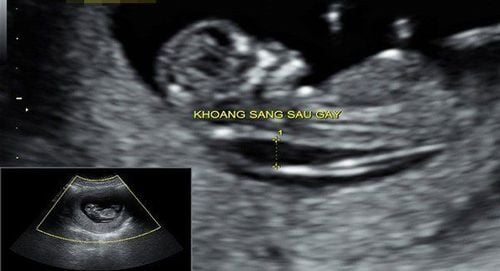This is an automatically translated article.
About 90% of pregnant women report feeling nauseous and vomiting during the first few months of pregnancy. And more than half of these will gradually reduce symptoms by the 14th week, but there are still many cases of vomiting and nausea until the time of delivery. To reduce this feeling of morning sickness, many problems have been raised, including the question, should antiemetic drugs be used for pregnant women?
1. Causes of morning sickness during pregnancy
With the change of hormones inside the body, many pregnant women experience morning sickness during pregnancy. Each person will have different symptoms and degrees of morning sickness, depending on their body condition.
For people with mild morning sickness, they only have nausea and vomiting that usually appear at one time of day. During morning sickness, pregnant women will feel unappetizing or vomit or not eat some foods that have a strong smell and taste. In mild cases, mothers can still eat and drink and there is nothing to worry about. Usually morning sickness goes away within the first 2-3 months of pregnancy.
Severe morning sickness occurs less frequently in some cases. Severe morning sickness makes mothers unable to eat anything, vomiting continuously during the day, pregnancy weight loss, fatigue, dizziness. Many pregnant women have to go to the hospital for a health check if their morning sickness is so severe that they can't eat or drink. Fortunately, morning sickness occurs in only a small number of women, about 1% of pregnant women.
2. How to reduce morning sickness in women without medication
Administer antiemetics to pregnant women as a last resort, because although many drugs are still prescribed to pregnant women today, this should still be considered if other measures are available to reduce vomiting. other morning sickness.
A few effective ways to reduce morning sickness during pregnancy that you can refer to, such as:
Using ginger Since ancient times, ginger has been known as an effective way to reduce morning sickness. Experts estimate that 1,000mg of ginger powder is equivalent to 10mg of metoclopramide to help fight vomiting extremely well. Not only that, ginger does not cause any side effects or affect the health of the mother and baby.
Accordingly, you can drink fresh ginger tea or eat ginger candy, ginger jam when nauseated.
Gargle several times a day A simpler way that you can do at any time is to spit and increase frequent rinsing. This also has the purpose of reducing unexpected nausea.
Eat many meals a day Anorexia, loss of appetite is a common condition of pregnant women who are suffering from morning sickness. However, the diet during this period is very important for the development of the fetus, so try to eat by dividing into many small meals a day. Eat each meal slowly and a little bit to feel the delicious taste of food as well as avoid the situation of eating and then vomiting all out.
Drink more water During pregnancy, you should stay away from carbonated drinks, soft drinks, and bottled water, but instead should add filtered water and healthy fruit juices. Drinking water between meals is also an effective way to reduce nausea. In addition, please note that you should increase your intake of fresh fruits and vegetables, stay away from hot and spicy foods, strong odors, the use of these foods will make morning sickness worse.
These are considered simple and effective morning sickness tips that any pregnant mother can apply for mild morning sickness. On the contrary, if the mother has severe morning sickness or has applied the above methods but is not very good, you can refer to how to use antiemetic drugs for pregnant women.
3. Method of using antiemetic drugs for pregnant women
Previously, the use of the drug was not recommended for pregnant and lactating women. Although today many drugs have been prescribed for pregnant women, to be safe, before using any medicine, mothers should consult a doctor, including antiemetics for pregnant women.
Some antiemetic drugs for pregnant women you can refer to such as:
Vitamin B6: Vitamin B6 is recommended for pregnant women for the purpose of minimizing morning sickness. Obviously vitamin B6 does not affect the health of mother and baby, so you can safely use it. The dosage of vitamin B6 during pregnancy is about 15mg per day. Antiemetic drug Domperidone: Domperidone has the main effect of stimulating intestinal peristalsis of the gastrointestinal tract, increasing the tone of the cardiac sphincter, increasing the relaxation of the pyloric sphincter after meals. Domperidone is not considered to cause birth defects, however, before deciding whether you should take this medicine or not, your doctor also needs to check and evaluate many other factors. Metoclopramide antiemetic drugs: Metoclopramide, when entering the body, they work with the mechanism of increasing peristalsis of the antrum, duodenum, jejunum, dilating the upper stomach, the purpose of helping the stomach empty to reduce reflux. from the stomach and duodenum to the esophagus. Thereby significantly reducing nausea in pregnant women. However, like Domperidone, this drug needs to be considered very carefully before taking it. Thiamine supplements: When vomiting persists, there is a high chance that pregnant women may be at risk of thiamine deficiency. In this case, pregnant women should be advised to supplement with thiamine in the amount of 100mg per day. The above is considered an effective way to reduce morning sickness for pregnant women. Either way, mothers should talk to a specialist to get the best indications. Avoid self-medication that can cause unfortunate consequences.
The above are reference information about whether to use antiemetics for pregnant women, hoping to give pregnant women good suggestions for a healthy pregnancy.
Please dial HOTLINE for more information or register for an appointment HERE. Download MyVinmec app to make appointments faster and to manage your bookings easily.













